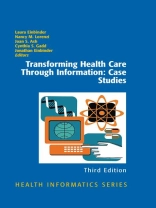By any measure, our field of clinical informatics is poised for rapid growth and expansion. A confluence of forces and trends, including pressure to contain health care costs and simultaneously expand access and coverage, a desire to reduce me- cal error and health care disparities, the need to better understand and optimize our clinical interventions and delivery systems, the need to translate new knowledge into practice quickly and effectively, and the need to demonstrate the value of our services, all call for the application of the methods and techniques of our field – some of which are well honed with experience, and some of which are still in the process of being discovered. Clinical informatics is not the only solution to what ails health care, but it is a critical component of the solution. Our methods and techniques are similar in many ways to the knowledge base of any interdisciplinary field: some are informed by experience, the trials and tribulations of figuring out what works through real world implementation, some are informed by controlled experimentation in randomized controlled trials and related studies, some are informed by critical observation and analysis, and some are developed through laboratory evaluation rather than field trials. As we develop both the basic science, as well as the applied science, of our field, there is a cri- cal role for learning from others by way of case reports and stories.
Tabella dei contenuti
Managing Change.- Back Breaking Work: Implementing a Spine Registry in an Orthopedic Clinic.- A RHIO Struggling to Form: Will it Get Off the Ground?.- A Rough Ride at the Theodore Roosevelt Cancer Center.- Implementation of an Electronic Prescription Writer in Ambulatory Care.- Online Health Care: A Classic Clash of Technology, People, and Processes.- Patient Safety.- A Dungeon of Dangerous Practices.- Different Sides of the Story.- Barcode Medication Administration Implementation in the FIAT Health System.- H.I.T. or Miss.- Organizational Impact and Evaluation.- The Implementation of Secure Messaging.- Who Moved My Clinic? Donnelly University Pediatric Rehabilitation: The Wheelchair Clinic.- Onco Orders: The Early Years.- Implementing a Computerized Triage System in the Emergency Department.- Medication Barcode Scanning: Code “Moo”: Dead COW.- Integration.- Project NEED: New Efficiency in an Emergency Department.- Digital Radiology Divide at Mc Kinly.
Circa l’autore
Nancy Lorenzi, Ph D, is a professor of Biomedical Informatics and Assistant Vice Chancellor for Health Affairs at Vanderbilt University Medical Center, Nashville, Tennessee.
Joan S. Ash, Ph D, is a professor of Medical Informatics and Outcomes Research at the Oregon Health and Science University Medical School, Portland Oregon.
Jonathan Einbinder, MD, MPH is Corporate Manager in Quality Data Management at Partners Healthcare System, Wellesley, Massachusetts.
Cindy Gadd, Ph D is a professor in Informatics at the Vanderbilt University Medical Center, Nashville, Tennessee.
Laura Einbinder, MBA is a Consultant at Einbinder & Associates in Medfield, Massachusetts.












